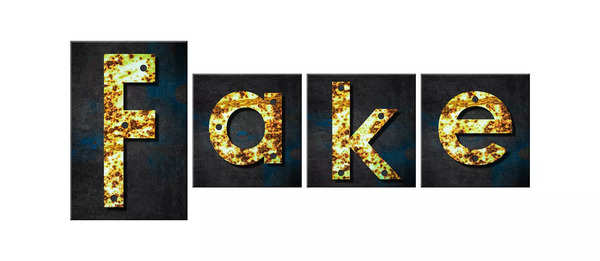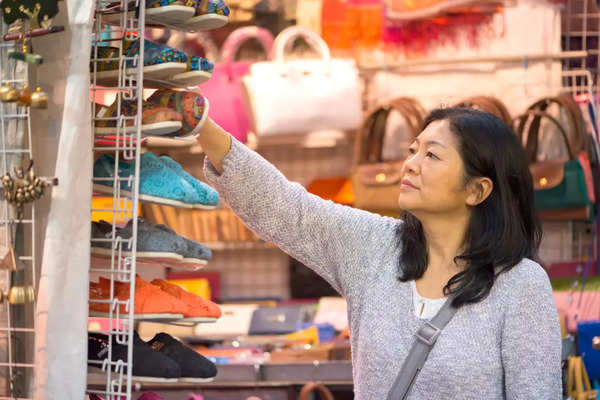- News
- lifestyle
- fashion
- style-guide
- Are you buying fake fashion brands? Here's why you should worry
Trending
Are you buying fake fashion brands? Here's why you should worry
Counterfeit fashion carries financial, health, and legal risks. It undermines authenticity and sustainability in the fashion industry, leading to social stigma and reputational damage. Stay vigilant and choose genuine items to support a responsible fashion industry.

In the glittering world of fashion, brand names carry an aura of prestige, quality, and desirability. However, the allure of high-end fashion often comes with a hefty price tag, leading many to seek out cheaper alternatives. Unfortunately, this has resulted in a booming market for counterfeit fashion brands. While buying fake fashion might seem like a harmless way to enjoy luxury for less, it comes with significant risks and ethical concerns.Here's why you should worry about purchasing counterfeit fashion items.

The impact on your wallet
At first glance, fake fashion items might seem like a great deal. They look similar to the original, cost a fraction of the price, and provide the thrill of owning something that appears luxurious. However, these items are often of inferior quality. The materials used are usually substandard, leading to faster wear and tear. This means that while you might save money initially, you will likely need to replace these items much sooner than their authentic counterparts. In the long run, you might end up spending more on replacements and repairs than if you had invested in a genuine piece.

Health and safety concerns
Counterfeit fashion items are not subject to the same rigorous safety standards as legitimate products. This lack of regulation can lead to serious health and safety issues. For instance, fake jewelry might contain harmful metals like lead or nickel, which can cause allergic reactions or more severe health problems with prolonged exposure. Similarly, counterfeit cosmetics can include dangerous chemicals not approved for use on the skin, leading to rashes, infections, or other adverse reactions. Clothing and accessories made with substandard materials might also be flammable or otherwise hazardous.
Ethical and legal implications
Buying counterfeit goods supports an illegal industry that often involves unethical practices. The production of fake fashion items frequently occurs in unregulated factories with poor working conditions, low wages, and even child labor. By purchasing these items, you are indirectly endorsing and perpetuating these inhumane practices. Moreover, counterfeiting is illegal, and buying fake goods can have legal repercussions. In some countries, possession of counterfeit items is punishable by law, leading to fines or other penalties.
The environmental toll
The fashion industry already has a significant environmental impact, and counterfeit fashion exacerbates this problem. Counterfeit items are typically made with cheap, environmentally harmful materials and processes. These products are not designed to last, contributing to the fast fashion cycle and increasing the amount of textile waste. Additionally, the production of counterfeit goods often bypasses environmental regulations, leading to higher levels of pollution and resource depletion. By choosing authentic and sustainable fashion, you can help reduce your environmental footprint.
Detriment to the fashion industry
Counterfeit fashion undermines the innovation and creativity of designers and brands. The fashion industry thrives on new ideas, quality craftsmanship, and brand reputation. When counterfeiters copy designs and logos, they devalue the original work and effort of designers. This can lead to financial losses for legitimate brands, affecting their ability to invest in new designs, technologies, and sustainable practices. Over time, this stifles creativity and reduces the overall quality and diversity of fashion available in the market.
The social stigma
Wearing counterfeit fashion items can carry a social stigma. Fashion enthusiasts and connoisseurs can often spot a fake, and being caught with counterfeit items can damage your reputation and credibility. In social and professional settings, wearing fake fashion can be seen as a sign of poor judgment or lack of integrity. Authentic fashion not only represents personal style but also reflects your values and choices. Investing in genuine pieces shows a commitment to quality, ethics, and sustainability.
How to avoid counterfeit fashion
To protect yourself from the risks associated with fake fashion, it's essential to be vigilant and informed when shopping. Here are some tips to help you avoid counterfeit items:
Buy from authorized retailers: Purchase items from official brand stores or authorized retailers. This significantly reduces the risk of buying counterfeit products.
Check for authenticity: Look for authenticity certificates, serial numbers, and other brand-specific markers that indicate a genuine product. Many brands provide information on how to verify their items.
Research the seller: When buying online, research the seller’s reputation. Read reviews and check for any complaints related to counterfeit products.
Inspect the product: Pay attention to details such as stitching, logos, and material quality. Counterfeit items often have noticeable flaws and inconsistencies.
Be wary of bargains: If a deal seems too good to be true, it probably is. High-end fashion items are rarely sold at steep discounts.
Educate yourself: Stay informed about the latest trends in counterfeiting and learn how to spot fake items. Many brands offer resources to help consumers identify counterfeit products.
The value of authentic fashion
Investing in authentic fashion is about more than just owning a luxury item. It’s about supporting creativity, quality, and ethical practices. Genuine fashion pieces often have better craftsmanship, durability, and resale value. They carry the brand's heritage and story, adding depth and meaning to your wardrobe. By choosing authentic items, you contribute to a sustainable and responsible fashion industry.
While the allure of counterfeit fashion might be tempting, the risks and ethical concerns far outweigh the benefits. From financial losses and health hazards to environmental damage and legal issues, buying fake fashion is a practice fraught with problems. By making informed choices and investing in genuine items, you can enjoy the true value of fashion and support a more sustainable and ethical industry. So next time you’re tempted by a seemingly great deal on a designer knockoff, remember the bigger picture and choose authenticity.

The impact on your wallet
At first glance, fake fashion items might seem like a great deal. They look similar to the original, cost a fraction of the price, and provide the thrill of owning something that appears luxurious. However, these items are often of inferior quality. The materials used are usually substandard, leading to faster wear and tear. This means that while you might save money initially, you will likely need to replace these items much sooner than their authentic counterparts. In the long run, you might end up spending more on replacements and repairs than if you had invested in a genuine piece.

Health and safety concerns
Counterfeit fashion items are not subject to the same rigorous safety standards as legitimate products. This lack of regulation can lead to serious health and safety issues. For instance, fake jewelry might contain harmful metals like lead or nickel, which can cause allergic reactions or more severe health problems with prolonged exposure. Similarly, counterfeit cosmetics can include dangerous chemicals not approved for use on the skin, leading to rashes, infections, or other adverse reactions. Clothing and accessories made with substandard materials might also be flammable or otherwise hazardous.
Ethical and legal implications
Buying counterfeit goods supports an illegal industry that often involves unethical practices. The production of fake fashion items frequently occurs in unregulated factories with poor working conditions, low wages, and even child labor. By purchasing these items, you are indirectly endorsing and perpetuating these inhumane practices. Moreover, counterfeiting is illegal, and buying fake goods can have legal repercussions. In some countries, possession of counterfeit items is punishable by law, leading to fines or other penalties.
The environmental toll
The fashion industry already has a significant environmental impact, and counterfeit fashion exacerbates this problem. Counterfeit items are typically made with cheap, environmentally harmful materials and processes. These products are not designed to last, contributing to the fast fashion cycle and increasing the amount of textile waste. Additionally, the production of counterfeit goods often bypasses environmental regulations, leading to higher levels of pollution and resource depletion. By choosing authentic and sustainable fashion, you can help reduce your environmental footprint.
Detriment to the fashion industry
Counterfeit fashion undermines the innovation and creativity of designers and brands. The fashion industry thrives on new ideas, quality craftsmanship, and brand reputation. When counterfeiters copy designs and logos, they devalue the original work and effort of designers. This can lead to financial losses for legitimate brands, affecting their ability to invest in new designs, technologies, and sustainable practices. Over time, this stifles creativity and reduces the overall quality and diversity of fashion available in the market.
The social stigma
Wearing counterfeit fashion items can carry a social stigma. Fashion enthusiasts and connoisseurs can often spot a fake, and being caught with counterfeit items can damage your reputation and credibility. In social and professional settings, wearing fake fashion can be seen as a sign of poor judgment or lack of integrity. Authentic fashion not only represents personal style but also reflects your values and choices. Investing in genuine pieces shows a commitment to quality, ethics, and sustainability.
Learn How to Contour Your Cheeks Like a Pro: A Step-by-Step Guide
How to avoid counterfeit fashion
To protect yourself from the risks associated with fake fashion, it's essential to be vigilant and informed when shopping. Here are some tips to help you avoid counterfeit items:
Buy from authorized retailers: Purchase items from official brand stores or authorized retailers. This significantly reduces the risk of buying counterfeit products.
Check for authenticity: Look for authenticity certificates, serial numbers, and other brand-specific markers that indicate a genuine product. Many brands provide information on how to verify their items.
Research the seller: When buying online, research the seller’s reputation. Read reviews and check for any complaints related to counterfeit products.
Inspect the product: Pay attention to details such as stitching, logos, and material quality. Counterfeit items often have noticeable flaws and inconsistencies.
Be wary of bargains: If a deal seems too good to be true, it probably is. High-end fashion items are rarely sold at steep discounts.
Educate yourself: Stay informed about the latest trends in counterfeiting and learn how to spot fake items. Many brands offer resources to help consumers identify counterfeit products.
The value of authentic fashion
Investing in authentic fashion is about more than just owning a luxury item. It’s about supporting creativity, quality, and ethical practices. Genuine fashion pieces often have better craftsmanship, durability, and resale value. They carry the brand's heritage and story, adding depth and meaning to your wardrobe. By choosing authentic items, you contribute to a sustainable and responsible fashion industry.
While the allure of counterfeit fashion might be tempting, the risks and ethical concerns far outweigh the benefits. From financial losses and health hazards to environmental damage and legal issues, buying fake fashion is a practice fraught with problems. By making informed choices and investing in genuine items, you can enjoy the true value of fashion and support a more sustainable and ethical industry. So next time you’re tempted by a seemingly great deal on a designer knockoff, remember the bigger picture and choose authenticity.
End of Article
FOLLOW US ON SOCIAL MEDIA










